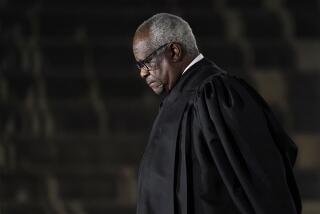Audit Says Guam Court Secretly Hired Lobbyist
- Share via
WASHINGTON — A long-awaited audit released Monday by the Guam public auditor has concluded that court officials in the U.S. territory apparently circumvented bidding requirements to secretly hire lobbyist Jack Abramoff to fight a proposal to reorganize the Pacific island’s judicial system.
According to the audit, bids were required for contracts in excess of $10,000. The payments to Abramoff, which totaled $324,000, were made in 36 checks issued to Laguna Beach lawyer and lobbyist Howard Hills. He, in turn, sent the money to Abramoff, the audit said.
“It appears that Howard Hills was paid in $9,000 increments to circumvent the sealed bid requirement,” Guam Public Auditor Doris Flores Brooks wrote.
The disclosures about the payments to Abramoff came in an audit of the Guam Superior Court’s Judicial Building Fund, the source of the money that was channeled to the then-influential lobbyist.
In 2002, Guam Superior Court officials sought the assistance of Abramoff, who was known for his ties to GOP congressional leaders, to block legislation before Congress that would have given the Guam Supreme Court control over the Superior Court.
According to Brooks’ audit, Superior Court officials initially engaged Hills to lobby against the bill. Hills, in turn, hired Abramoff. The audit noted that lobbying reports filed by Abramoff’s firm to the U.S. Senate identified Hills as its client, even though the payments ultimately came from the Guam Superior Court.
The audit stated that the contract between the Superior Court and Hills “was ambiguous and did not contain elements of a well-written contract, such as the start and completion date, a description of the legal services to be provided and the rate or basis of compensation.”
Several change orders and extensions were made to the original contract, according to the audit, which noted that a total of $479,000 was eventually paid to Hills.
“In a May 2005 interview, Mr. Hills stated that of the $479,000 he received, $324,000 was transferred to Jack Abramoff’s firm,” the audit said. “The agreement that the Superior Court entered with Howard Hills was vaguely defined and did not disclose the true intent of the lobbying effort.”
Abramoff was successful in efforts to block the reorganization bill in 2002, but two years later Congress approved another bill adopting the restructuring.
The audit also found that the Superior Court failed to file required reports on the payments with the Internal Revenue Service.
In addition to chastising the Superior Court, Brooks’ report faulted the Guam Supreme Court for allowing a lobbyist it had hired to support the reorganization bill to begin work before the contract was formally approved. The Supreme Court paid its lobbyist $85,039.
Abramoff, who was indicted in August on unrelated federal fraud charges in Florida, is also the subject of a wide-reaching federal grand jury inquiry into his lobbying activities on behalf of American Indian tribes with casino interests.
One of his former business associates, Michael P.S. Scanlon, entered a guilty plea last month to federal conspiracy charges related to the Indian casino investigation. A former top government procurement official, David H. Safavian, was indicted in October in connection with an investigation of a golf trip to Scotland arranged by Abramoff.
More to Read
Sign up for Essential California
The most important California stories and recommendations in your inbox every morning.
You may occasionally receive promotional content from the Los Angeles Times.













